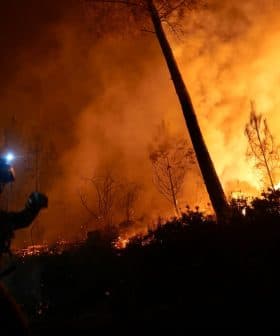Record Temperatures Will Threaten Global Food Supply, Scientists Warn

The World Meteorological Organization has warned that global temperatures are expected to surpass the 1.5°C warming threshold in the next five years, with a 66 percent chance of crossing that limit by 2027. The rise in temperatures is attributed to a combination of El Niño, warming oceans, and human-induced climate change, with significant impacts expected on health, food security, and the environment.
The World Meteorological Organization (WMO) has warned that the world will become warmer in the next five years, with average near-surface temperatures likely to exceed the 1.5 °C warming threshold.
According to the WMO’s Global Annual to Decadal Update report, there is a 66 percent chance for the 1.5 °C limit to be crossed by 2027, while it is almost certain (at a probability of 98 percent) that at least one of the next five years, and the five-year period from 2023 to 2027, will be the hottest on record.
A warming El Niño is expected to develop in the coming months and this will combine with human-induced climate change to push global temperatures into uncharted territory.
“Global mean temperatures are predicted to continue increasing, moving us away further and further away from the climate we are used to,” said Leon Hermanson, a scientist at Met Office, the United Kingdom’s national weather service, who led the report.
Under the 2015 Paris Climate Agreement, the world’s nations pledged to keep the rise in global temperatures below 2 °C – and preferably below 1.5 °C – this century compared to pre-industrial levels to stave off a chain reaction of possibly irreversible effects on the planet.
See Also:Climate Disasters Drive Olive Oil Prices HigherThe meteorological organization attributed the projected surge in global temperatures to the combinatorial effects of an expected El Niño phenomenon, a warming of the ocean’s surface, and anthropogenic climate change.
“A warming El Niño is expected to develop in the coming months, and this will combine with human-induced climate change to push global temperatures into uncharted territory,” said Petteri Taalas, the organisation’s director-general.
“This will have far-reaching repercussions for health, food security, water management and the environment,” he added. “We need to be prepared.”
The planet has never experienced a rise in average temperatures above the 1.5 °C threshold. The highest recorded increase in global temperatures in previous years was 1.28 °C above pre-industrial levels.
The WMO also noted that El Niño typically increases temperatures in the year after it develops, meaning that the effects of the expected El Niño in global temperatures are expected to be perceived no sooner than 2024.
The organization nevertheless clarified that the expected surge in temperatures above the 1.5°C limit would be temporary.
“This report does not mean that we will permanently exceed the 1.5 °C level specified in the Paris Agreement, which refers to long-term warming over many years,” Chris Hewitt, director of climate services at the WMO, told Olive Oil Times.
“However, WMO is sounding the alarm that we will breach the 1.5°C level on a temporary basis with increasing frequency,” he added.
Hewitt also said that the Mediterranean region is expected to experience extensive consequences of the increase in temperature.
“Petteri Taalas said at the [WMO report] press conference that indeed Europe and the Mediterranean is one of the regions which will be impacted by rising temperatures and changing precipitation patterns,” he said. “The Intergovernmental Panel on Climate Change also has indicated this.”
Other regions, including Northern Europe, Alaska and the Sahel in Africa, will likely receive increased rainfall in the next five years, while reduced precipitation levels are forecasted for the Amazon and parts of Australia, the WMO report said.
Meanwhile, the ‘global stocktake,’ a component of the Paris Agreement used to assess nations’ collective progress toward meeting the agreement’s climate goals, is expected to dominate the agenda in the United Nations COP28 climate summit scheduled to take place in Dubai in November.
“The global stocktake will provide critical information for countries and stakeholders to see what progress has been made on meeting the Paris Agreement goals, as well as identify any remaining gaps and opportunities for increased action,” said Joanna Post, the program officer with the U.N. Climate Change’s intergovernmental support and collective progress division.
“To put it simply – the global stocktake will help spur countries to step up climate action to avoid the worst impacts of climate change,” she concluded.









